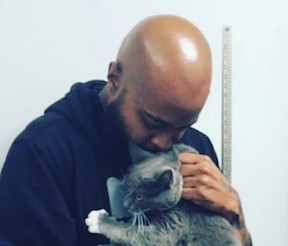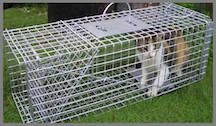From Rapper To Trapper
Sterling Davis, Trap King
 The TrapKing Sterling Davis spreads the word about Trap-Neuter-Release (TNR) and his approach to educating and engaging different demographics while ending the "crazy cat lady" stereotype! "Gotta let the fellas know, you don't lose cool points for compassion"
The TrapKing Sterling Davis spreads the word about Trap-Neuter-Release (TNR) and his approach to educating and engaging different demographics while ending the "crazy cat lady" stereotype! "Gotta let the fellas know, you don't lose cool points for compassion"
In order to prevent spreading disease and overpopulation of cats, it is Sterling Davis' mission to go out and catch stray cats in the Atlanta area. He then brings them to a low cost spay neuter clinic where they get spayed or neutered and vaccinated. He then returns them back to their colony.
It's not only the Atlanta area that has a problem with feral cats. There are a lot of homeless cats everywhere. This is because cats can have a litter of around four to six kittens. As those kittens mature, they then go on to have litters of their own and it doesn't take long for them to overpopulate an area. Once they do that, then they're all fighting over resources and spreading disease. So TNR is a humane alternative to just putting them down.
You've all heard about the crazy cat ladies? Unfortunately the "cat" industry is made up of mostly women and it is rare to hear of men helping out with feral cats. So how did Sterling get involved? Sterling tells us he was doing music first. He was touring and while in between tours, he was looking for something to do that wasn't going to be stressful or hard work. So he looked on Craigslist and saw a shelter that was hiring for cats and he just loves cats!
When he went in to apply, everyone was looking at him like, "Oh my goodness, we don't see too many guys that mess with cats like this!" So of course they wanted him to stay.
Sterling started out by scooping litter and from there started doing TNR and community outreach programs. The music industry paid him a lot more, and all of his friends were always asking if there was something wrong with him!
There are a lot of rappers out there and there's a lot of different ways that young black men can wrap, but according to Sterling, how many people will be able to have an effect like this? So he wanted to do something that would have a positive effect. Something that would not just be cool, but morally good for him and morally fulfilling.
So does Sterling ever combine his wrap with his love for cats? He tells us he was actually in the studio the other night working on a cat song, the first TNR cat song. Sterling says it's going to be kind of crazy, but he wants it to be fun. One of the things he wants to do is to make TNR and animal rescue more fun and something that men in the black community want to get more engaged into.
 Growing up, Sterling admits that he's always been weird the weird guy. He's always been like Jimi Hendrix, a weirdo, a nerd, whatever was weird and he was that guy. Now he's starting to seem a little cool. His friends are like, "You know man, all of them cat ladies, like some of them like you? They want to talk to you?" He tells them, "Yeah, I get girls!"
Growing up, Sterling admits that he's always been weird the weird guy. He's always been like Jimi Hendrix, a weirdo, a nerd, whatever was weird and he was that guy. Now he's starting to seem a little cool. His friends are like, "You know man, all of them cat ladies, like some of them like you? They want to talk to you?" He tells them, "Yeah, I get girls!"
Originally, Sterling worked for a company for about five or six years and probably trapped and neutered around 1,000 cats. This was easy to do with all of the resources and tools they made available to him. Since starting his own non-profit company, Trap King Humane Cat Solutions, which he started in August of 2017, he has done less than 100. However, it's picking up a lot. Sterling's main thing is the education. He wants to teach people that they can do this as well.
Sterling does the trapping and returning, so who does the neutering? In Atlanta, Georgia where he is located, he uses Planned PEThood. However, he tries to work with any low cost spay, neuter clinic. Surprisingly, he tells us that in animal rescue there is a lot of bickering amongst shelters, so one of the things that he tries to do as well, on the human side of things, is work with everybody. Even though he uses Planned PEThood more frequently, he has worked with PAWS, Good Mews and everybody else that he can because he wants to represent and show the unity that has been in animal rescue for so many years. He wants to show that to the world and keep it going.
At home, Sterling has a big fluffy Persian Himalayan named Rick James, who is his main buddy. He also has Binx, who is a grey and brown tabby that was supposed to get adopted, but he ended up hanging out with Sterling and stayed. He also has four dogs together with his roommate. On top of all of this, Sterling does pet sitting if he's not running around trapping animals.
Sterling's goal is to spread the word about TNR and make it look fun because it is fun! He says it's fun; rewarding and you're helping. It's a selfless act that's being a voice for the voiceless and helping somebody else out. So it's good all the way around. Sterling also wants all cat men to unite!
Visit Website
Music Calms The Savage Beast
Terry Woodford, Canine Lullabies
 Multi-platinum musician Terry Woodford's Canine Lullabies are being played in over 2,500 rescue and shelter facilities. The results are quite remarkable. The music, with a heartbeat in the mix, reduces anxiety and comforts sick animals.
Multi-platinum musician Terry Woodford's Canine Lullabies are being played in over 2,500 rescue and shelter facilities. The results are quite remarkable. The music, with a heartbeat in the mix, reduces anxiety and comforts sick animals.
Terry is an amazing musician who has gone from Rock & Roll to Rock-A-Bye! He has eight golden and three multi-platinum records. He's worked with Motown acts like The Commodores, The Temptations and The Supremes, to name a few. However, while his latest project involves music, it is not meant for humans. Terry is the creator of Canine Lullabies, Heartbeat Music Therapy for dogs. Surprisingly, it wasn't created with dogs in mind; it was originally created to calm babies and children.
For 15 years after creating the lullabies for humans, Terry kept getting calls and emails from people saying that the same music calmed their dog. Terry thought this was strange and just laughed it off.
This all changed when Terry saw it calm 50 dogs in less than two minutes in a Colorado Humane Society. This was Terry's first time in a humane society and as usual, there was much barking and chaos going on among the animals. However, within 15 seconds of his CD playing, all of the dogs lied down in their cages. Terry was amazed and thought it was a fluke. In fact, he told them he wanted to walk back down the aisles, as he was sure the dogs would jump up and start barking again. However, not one dog paid attention to him.
After years of laughing it off to all those people who told him about it, he knew he was wrong. He just didn't know how important it was at that time.
Of course he's thought about it since then, particularly for dogs in kennels, as it helps make these dogs more adoptable. They're suffering from separation anxiety and in a chaotic environment, so this music helps. The music also helps the people that are working with the dogs, as it's really stressful for them sometimes when all the dogs are barking and upset. So while it was a surprise to Terry, it was also an exciting thing at the same time.
Heartbeat music therapy for dogs, explains Terry, really doesn't have any science behind it. He says the truth is when he first developed this music, the real reason he put the heartbeat in there, which was recorded from the chest, is because that's where a baby lays his head and they can feel your heartbeat. The other reason he did it is because he knew if his peers thought he was in the studio recording lullabies, he'd be on his way out. So he had to do something kind of cool and he had no idea that what he would end up with would be something that changed his whole life.
Babies and animals can hear and feel their mother's heartbeat in the womb, which is very soothing to them. In fact, hearing is the first sense they have. Dogs have such a great sense of hearing and a search dog can even hear a human heartbeat from 75 feet away. So, they are certainly familiar with the human heartbeat.

 Canine Lullabies can be played to reduce barking, to reduce diarrhea, to reduce stress from separation anxiety, settle hyperactivity and comfort sick or injured dogs, all of which make dogs in shelters more adoptable.
Canine Lullabies can be played to reduce barking, to reduce diarrhea, to reduce stress from separation anxiety, settle hyperactivity and comfort sick or injured dogs, all of which make dogs in shelters more adoptable.
It is also a soothing alternative to thunder phobia, which frightens both people and animals. In the case of thunder, you would play it for your pets before the thunderstorm so they can focus on that and habituate or block out the rest. Terry thinks one of the biggest things for people at home is separation anxiety in their dogs when they have to leave them at home. For these dogs, you can let the Canine Lullabies play all day long and they can tune it in or tune it out and it will keep them calm.
While you might not think your cat gets stressed, if they are frightened they will go hide someplace. They can even shake all over and get diarrhea, etc. The CD will also calm them and they'll actually come out from their hiding place to the music and not be so upset and excited.
Even though it calms difference species, Terry still calls it Canine Lullabies. When he originally tested the CD for dogs, he just took the CD that he'd done for babies and put a paper label on it and called it Canine Lullabies, stating that research was done on human babies first! At that time, he still wasn't taking it real serious. However, when he was told that it reduced diarrhea and kept dogs from barking and until he saw it for himself, it was just hard for him to believe.
There are two CD's of Canine Lullabies, with 9 songs on one volume and 18 on the other. If you're a shelter or animal clinic, you can get them at no charge. Just request a copy and he will send it to your free. Terry says it's a good way for him to help thousands of dogs and cats with very little cost to him.
There is even a satisfaction guarantee. If for any reason your dog is not completely satisfied with Canine Lullabies, you can return the CD. Terry says that maybe one out of every two thousand that are sent out are returned. He tells us a story of when the American Board of Kennels Association first tested his music, there was a kennel up in the northeast that sent him an email and said, "We think your music is very interesting but we have more cultured dogs here. And they prefer smooth jazz!"
Visit Website
Don't Litter - Spay or Neuter Instead! - Dr. Debbie
 World Spay Day is February 25, 2020. Do you believe your beautiful pedigreed pooch just has to be bred, or that your cat can't possible get outside to become pregnant, or that you long to have just one litter from Fluffy? If so, listen in to the unified pet health message of Spay Day. Shelter staff, veterinarians, and animal advocates all join together to encourage spaying and neutering. It's the right thing to do for your pet's health, and is a step forward in addressing pet overpopulation issues. With approximately 4 million dogs and cats euthanized at U.S. shelters every year, pet owners can do their part to avoid unintended and unnecessary breeding.
World Spay Day is February 25, 2020. Do you believe your beautiful pedigreed pooch just has to be bred, or that your cat can't possible get outside to become pregnant, or that you long to have just one litter from Fluffy? If so, listen in to the unified pet health message of Spay Day. Shelter staff, veterinarians, and animal advocates all join together to encourage spaying and neutering. It's the right thing to do for your pet's health, and is a step forward in addressing pet overpopulation issues. With approximately 4 million dogs and cats euthanized at U.S. shelters every year, pet owners can do their part to avoid unintended and unnecessary breeding.
Your individual decisions on altering your pet do matter. Animals, left to do what they will, result in a lot of generations of whiskers and tails in just a short period of time. A pair of dogs can produce 67,000 puppies in 3 years' time. And cats in that same time frame can prosper to over 420,000 kittens.
Common Spay & Neuter Fallacies:
Isn't it better to let my female dog go into heat before I spay her?
FALSE. You can minimize the risk of breast cancer to zero by spaying before the first heat. Allow her to have a few heat cycles, and your dog has a 25% chance of developing breast cancer. The health benefits for females also include preventing uterine cancer and the life-threatening reproductive infection, pyometra.
Isn't it better to let a female dog have at least one litter of pups?
FALSE. There is no psychological or health benefit in allowing a female dog to have a litter. It does not make her a better, more affectionate pet. On the contrary, some pregnant female dogs are quite protective and aggressive to anyone disturbing her brood.
My dog is a purebred dog with a pedigree so it is meant to be bred.
FALSE. Having purebred papers doesn't mean an animal has to be bred. There is no shortage of purebred animals, with purebred dogs accounting for 30% of all animals currently in shelters.
 It's a great experience to allow children witness the beauty of birth by letting your pet have a litter.
It's a great experience to allow children witness the beauty of birth by letting your pet have a litter.
STOP. What really is beautiful is to impart children with a sense of value toward animal life. Yes, birth is a miracle to behold. But there are many books and videos that demonstrate birth in a responsible manner, without unnecessary pet breeding.
Teach your children to care for your existing pets, from puppyhood or kitten hood until senior pet years. Children learn responsibility while caring for a pet and develop an appreciation for the human-animal bond by living it daily.
Won't spaying or neutering my pet make my pet fat?
FALSE. You directly control what, when and how much your pet eats. The fate of your pet's waistline lies in your hands. Your pet's metabolism may slow down some after spaying or neutering, but with sensible feeding and regular exercise you can maintain a healthy weight for your pet.
It's expensive to spay or neuter my pet.
FALSE. There are many affordable solutions to ensuring your pet is spayed or neutered. Some veterinary hospitals and shelters offer special programs on Spay Day. And other facilities offer year round low-cost options.
Still not convinced spaying & neutering is worth it? Consider that the cost of spay or neuter is less than the cost of raising kittens or pups for a year. And don't ignore the possible realities of pregnancy problems. An emergency C-section for a pet having labor difficulties costs $1000 or more.
I want my dog to guard the house. Won't spaying or neutering make my pet less protective?
FALSE. There is no relation between your pet having reproductive organs and performing as a guard dog. A dog's protective behavior is based on instinct and training. Surgically spaying or neutering doesn't change your pet's devotion to protect home and family members. And once a dog is spayed or neutered, it has less desire to roam away from home to find a mate.
Take action now.
Of course you want to do what's best for your pet. Life is busy with family demands, work and a stream of errands. But don't delay this important step to keep your pet healthy for a lifetime together with you.
For more information on Spay Day visit the Humane Society.
Featured veterinarian known as "Dr. Debbie" on national pet radio program, Animal Radio. Ebook author of "Yorkshire Terriers: How to Be Your Dog's Best Friend"; "Pugs: How to Be Your Dog's Best Friend"; "Mini Schnauzers: How to Be Your Dog's Best Friend"; and "Shih Tzu: How to Be Your Dog's Best Friend." Dr. Debbie's books.
Visit Website
Animal Radio News - Lori Brooks
 Could Your Pet's GPS Leak Sensitive Information?
Could Your Pet's GPS Leak Sensitive Information?
Smart collars and other devices for animals that track their locations are very popular now. However the problem, according to researchers, is that these tracking devices can leak sensitive information like your phone number, your pet's location or home network details. After examining several well-reviewed models, including Kippy Vita, the Nuzzle Pet Activity and GPS Tracker and the Whistle 3 GPS Pet Tracker & Activity Monitor, testers at Kaspersky Lab found several issues that should be of concern. One common problem found in some of the trackers is the use of Bluetooth Low Energy (BLE), which connects the pet-tracker to the owner's smartphone, but unlike the full implementation of the Bluetooth spec, BLE doesn't require authentication in order to pair devices. That means that any smartphone can connect to the tracker to control it and access the pet's location. Another area of concern is that some of the trackers have shared flaws stemming from certificate handling and data-transfer mechanisms. Just one of the tested Android apps (the Weenect WE301) verifies the certificate of its server, making the other models vulnerable to man-in-the-middle (MITM) attacks. Maybe scariest of all, two of the trackers can be disabled or hidden from owners. For instance, it's possible to install modified software on the Nuzzle tracker by simply changing the checksum in the DAT file. This can be used to cause the device to stop working. And perhaps worst of all, an attacker can conceal the location of the pet simply by connecting to the tracker using a smartphone. An attacker can also hide the Whistle 3 from the pet owner. If a hacker continuously transmits a command for the device location, the gadget will not send location data via the SIM card, since it will assume that such data has already been received directly. Also, it transmits data to the server without any authentication, so an attacker could substitute alternate pet coordinates. Connected things are burrowing further and further into our everyday lives, with everything from thermostats to Amazon Echo to washer/dryer sets and beyond now offering convenience and safety apps for consumers to make their lives easier and more hackable. The pet-tracker class of connected gadgets adds one more layer of vulnerability, but calling attention to the flaws could be a wake-up call to the manufacturers.
 Don't Lease a Pet!
Don't Lease a Pet!
Buying a pet at a pet store can end up costing twice what it says on the price tag if you are lured into signing a pet-leasing contract. Yes, you can lease cars, houses, furniture, property and now you can also lease pets. Here's one story of what happened to a woman in Brooklyn, New York, when she fell in love with a Frenchton puppy (a French bulldog and Boston Terrier cross) at a pet store but couldn't afford the $1,350 price tag. A salesperson talked her into a payment plan. Then when she got home, she read the contract closer. It turned out that "Little Jane" the puppy really was not actually hers, nor would she be until after two years of monthly payments totaling nearly $3,000 plus a balloon payment of $275. And if she failed to pay, the leasing company could repossess Little Jane. Pet leasing has been drawing scrutiny from lawmakers and animal welfare groups since last year when many consumer s filed complaints against Reno, Nevada-based Wags Lending, which pioneered the practice of loans to lease pets. Nevada and California have outlawed pet leasing and New York lawmakers are proposing legislation prohibiting lease contracts "where dogs or cats are used as collateral." Like consumer loans, pet leases are offered to people who want to buy a purebred puppy or a so-called "designer" dog but can't afford prices that often exceed $1,000 at a pet store. Wags leasing, which says it has handled 66,000 pet leases, claims it doesn't charge interest, like that on a loan. Rather, it charges a monthly lease fee, which is renting of the animal plus depreciation. The Better Business Bureau in Fresno, California, looked at the cost calculator on one pet leasing company's website and found that if you bought a dog for $2,000, you could have a monthly payment as high as $293 for 24 months, bringing the dog's final cost to more than $7,000. And if you stop making payments, the company has the right to take your animal back and ding your credit score.
 Cat Is Safe After 60mph Ride on Roof
Cat Is Safe After 60mph Ride on Roof
A viral video shows cat seen clinging for dear life to the roof of a van speeding down a highway in Omaha, Nebraska. Luckily, Rebel, the fluffy gray and white cat in the May 18 video, is safe and sound and he had no injuries from his ordeal. Poor Rebel was taken for the ride of his life when his parents unknowingly took off in their van. The ride got up to speeds of 60 mph going down an interstate and the owner had no clue Rebel was on the roof. They went for about two miles before people in a passing car noticed Rebel and shot the video and were able to notify the owners there was a cat on the roof of their van.
Super Bowl For Sniffer Dogs
The United States Police Canine Association held the Detector Dog competition, which featured more than 100 dogs from across the country. Police dogs from New York, New Jersey, Pennsylvania, Iowa, North Carolina, South Carolina, Missouri, Maryland, Virginia, Florida, Tennessee and Washington, D.C. competed, as did dogs from the FBI and CIA. The competition is considered the Super Bowl for sniffer dogs. The winner in the explosives class is 8 years old, already going gray. His name is Hemi, a chocolate Labrador assigned to the Campus Police Force at New Jersey's Stockton University. Another New Jersey dog, 5-year-old Belgian Malinois, Luna, took top honors for dogs trained to find hidden drugs. The reward? Luna loves nothing more than a ball to chew on and chase, while Hemi chooses to chew on a white towel, but he also got a big beef patty as a bonus to celebrate.
 Listen to the entire Podcast of this show (#1055)
Listen to the entire Podcast of this show (#1055)





